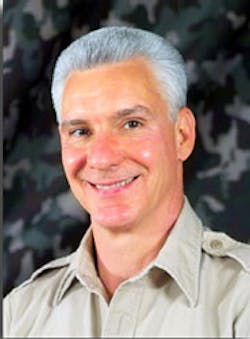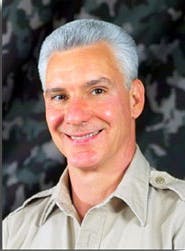The September article by Charlie "Tec Daddy" Greer for his "Superior Level of Service" column marks Charlie’s 200th appearance as a monthly columnist for Contracting Business. That amounts to roughly 170,000 words over three decades. And all that time, he’s never taken a cent for his writing.
Charlie’s loyalty to CB is impressive. And, his prime motivator was never money. It was always about sharing his sales methods with others, particularly those involved in residential HVAC sales. Whether in print, or in appearances at our great Comfortech show, Charlie was always ready to help.
Born in Cincinnati, Charlie Greer grew up in Ohio, New York and Pennsylvania, going wherever his father’s work as a disc jockey took the family.
He started in plumbing in 1975, working as a research assistant for a Cleveland oil company. He spent about a year cutting, threading, and welding black pipe. He also became the go-to plumbing expert for friends. He eventually moved from Akron to Fort Myers, Fla. in 1983.
He recalls, “I read a book called ‘Moving to Florida’ that recommended, if you move to Florida, and you’re open to a career change, get into air conditioning. Later, I saw a classified ad for an HVAC sales trainee, and jumped on it.”
Greer’s HVAC career began differently, in that he started in sales.
Our October edition will carry a feature article on Charlie Greer's career contributions to the HVAC industry.“
"As a salesman, I knew that my best source of leads was the company’s service technicians. However, due to the actions of other salespeople, the service technicians were reluctant to turn in leads. Around 1988, I started riding with the service technicians during the off-season in an effort to show them that I was a regular guy and not some vulture who was looking to take advantage of old ladies," he recalls.
“That worked. As I ran calls with them, I couldn’t help but notice that nearly every tech I worked with was overlooking, ignoring, and in some cases, actively avoiding obvious sales opportunities.”
"One of my great regrets is that I've had no formal HVAC technical training. It's all been on-the-job. Fortunately, I've always been mechanically inclined. For instance, in college, I had a job repairing the automatic pin-setting machines in bowling alleys, even though I had no training on them whatsoever. They'd break down in the middle of a game, I'd figure out what was wrong, and fix it right on the spot."
Riding along with technicians helped Greer learn the technical aspects of HVAC products. "The equipment back in the 1980's was much simpler than today's equipment, and it wasn't long at all before I was running solo calls," he says.
Eventually, he was confident enough in his technical skills to volunteer to be the “on call” technician on weekends. That got him started running regular service calls.
"It didn't take too long for the company to realize that, if the equipment was at least 15 years old, and all the decision-makers were going to be home, that their best bet was to send me on that call."
By 1990, Greer started traveling the country, running service calls with HVAC technicians.
"I was turning in excellent figures and getting a lot of recognition for my work. Around 1992, plumbers began demanding that I ride with their techs, so I did," he says. "All in all, I rode with over 3,000 service technicians over a 15-year period. As it worked out, I had a knack for running residential maintenance plumbing and was immediately successful at it."
Greer speaks proudly of the fact that even though his sales figures helped build his reputation and recognition, during his last 10 years as a sales technician, he had no warranty callbacks due to workmanship or negligence, no complaints, and even no inquiries after-the-fact by the husband that wasn't present during the call or the nosey neighbor.
Timeless Issue: Recruiting & Retention
Before he began his monthly column for CB, Charlie’s first appearance was as a feature writer, in June of 1992, in an article on how to improve employee loyalty. Even then, the industry had retention and recruiting issues!“Today,” he says, “employer efforts are at an all-time high and loyalty on both parts is at an all-time low. Employers are trying everything they can to recruit and retain employees, and not much of it works.”
I know of a company that retains its service technicians, but not much is asked of them.
Greer believes technicians are turned off by too much pressure to sell.
"You see this especially in companies that are 100% incentive-based pay, or close to it. A technician runs a few calls and doesn't sell anything, gets a low paycheck, and quits. It's not just the low paycheck that drives them away, it's the criticism from the boss, and the rejection from their customers. They're also not comfortable in knowing they have to sell something, whether it's needed or not, just to put food on the table. Just about every time you read negative reviews where the primary complaint is that every time they call that company they put the hard sell on them, it's a company with heavily incentive-based pay. Techs just don't like that."
He says technicians also prefer not to work forced overtime.
"No one was ever crazy about the hours during the busy season, or being on-call, but the current crop of technicians just won't stand for it," he asserts. "What's funny is that a tech will quit one company and go to another because he's told in the interviewing process that they won't work him to death, even though he's replacing someone they worked to death, who went to another company who told him they won't do that to him, and both techs are going to be run into the ground."
He continues: “I really think the hours are what keeps technicians from recommending this career to their family and friends. I also think that the way to retain techs, especially these days, is to reduce after-hours calls and, as long as they’ve put in an honest eight hours, let them stop taking calls when they feel like it. Everyone has always needed a life outside of work, and techs these days demand it more than ever. People are always asking me what I think is the best incentive to give techs. I think it’s time off. It doesn’t even have to be paid time off.”
Scripts Support Communication with Customers
Charlie Greer has always been the master of “scripts,” which are memorized (but not robotic) responses that technicians can rely on in a wide variety of sales situations to describe system solutions and respond to customer objections.
"If you don't have a scripted way to run calls, it means you don't know what works, because if you knew what worked, you'd do it the same way every time," he says.
Greer's scripts for techs are:
- The greeting at the door
- The explanation that you'll be looking everything over
- Price conditioning prior to presenting the price
- How to present the price and ask the closing question
- Numerous ways to overcome all the common objections.
"Contractors are constantly seeking sales solutions that don't require technicians to communicate effectively, but I don't see that happening anywhere in the near future. Techs are still going to have to know how to make a good impression, and establish the need and the sense of urgency," he says.
Even though these apps are promoted as a sales tools, Greer says all they really do is show the price and make up for poor handwriting and math skills.
"I'm working on an app right now that's currently being beta tested and will be ready in a year, but even with my app, you're still going to need people skills to maximize your opportunities," Greer says.
And in today’s “app-happy” world, he says, “Contractors are constantly seeking sales solutions that don’t require technicians to communicate effectively, but I don’t see that happening anywhere in the near future. Techs are still going to have to know how to make a good impression, and establish the need and the sense of urgency. I do believe that apps will change the role of residential replacement salespeople. More and more contractors are putting the prices for installed systems online, and I can see that trend increasing. However, even after a customer orders a replacement system online, someone is going to have to go out, prior to sending an install crew, and make sure they ordered the right system for the home, which they'll probably never do, and go over their other options. That's where the salesperson comes in. Those calls should be easy to upgrade."
The piece of advice he continues to recommend to his students: "Don't recommend anything that you wouldn't buy if you were them. Along the same lines, it's hypocritical to recommend that people buy things that you haven't bought yourself, for instance indoor air quality products. I've always felt that, if I'm sold on the recommendations I'm going to make, the job is 80% of the way sold."
Our October issue will carry an in-depth article about Charlie Greer, his methods and seminars, and further reflections on his years in HVAC.
About the Author
Terry McIver
Content Director - CB
As director of content for Contracting Business, he produces daily content and feature articles for CB's 38,000 print subscribers and many more Internet visitors. He has written hundreds, if not two or three, pieces of news, features and contractor profile articles for CB's audience of quality HVACR contractors. He can also be found covering HVACR industry events or visiting with manufacturers and contractors. He also has significant experience in trade show planning.

